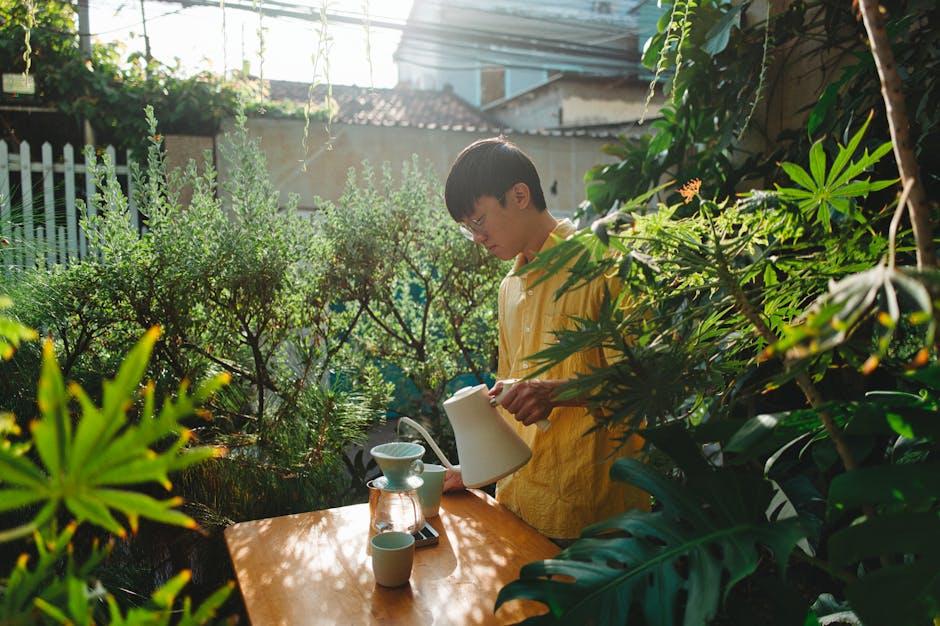In the quiet rhythm of planting seeds and tending to blossoming greens, there lies an often overlooked sanctuary for the mind. Gardening, beyond its surface of soil and sprouts, offers a unique blend of tranquility and purpose that can nurture mental well-being. As we delve into the mental health benefits of gardening, we uncover how this age-old practice cultivates not just gardens, but resilience, mindfulness, and emotional balance in those who embrace it. Whether you are an experienced horticulturist or a curious beginner, the simple act of connecting with nature through gardening may hold profound rewards for your inner landscape.
The Therapeutic Power of Connecting with Nature

Spending time outdoors, immersed in the sights, sounds, and smells of a garden, engages all our senses in a way that modern technology rarely can. This sensory connection to the natural world has a profoundly calming effect on the mind, reducing stress hormones and promoting a sense of peace. When tending to plants, the simple acts of digging, watering, and nurturing life tap into an ancient rhythm, fostering mindfulness and grounding us in the present moment. This process can be especially healing for those facing anxiety or depression, as it gently pulls the mind away from spiraling thoughts and toward tangible, nurturing tasks.
The advantages go beyond emotional calmness, extending to tangible improvements in mental clarity and cognitive function. Studies show that regular interaction with green spaces can boost memory, attention span, and problem-solving skills. Incorporating gardening into daily life provides a natural antidote to mental fatigue and burnout, creating space for creativity and reflection. Some remarkable benefits include:
- Enhanced mood stability as exposure to sunlight increases serotonin production
- Improved sleep quality driven by physical activity and natural light cues
- Reduced symptoms of PTSD and chronic stress through sensory engagement with plants and soil
| Benefit | Therapeutic Effect |
|---|---|
| Touching soil | Boosts mood via serotonin release |
| Sunlight exposure | Improves Vitamin D synthesis for mental health |
| Plant care routine | Encourages mindfulness and reduces anxiety |
How Gardening Cultivates Mindfulness and Reduces Stress

Amidst the gentle rhythm of planting seeds and nurturing sprouts, gardening naturally draws one into a present-focused state. This deliberate attention to the small details-the feel of soil between fingers, the subtle shift of sun on leaves, or the soft hum of bees-encourages a profound sense of mindfulness. As distractions melt away, each task becomes a form of meditation, fostering calm and sharpening awareness. The repetitive, grounded activities help dissolve mental clutter, allowing for a restorative mental pause that decreases anxiety and promotes inner balance.
Engaging in garden care also creates a sanctuary where the benefits of nature and purposeful action combine to reduce stress. The process activates the senses, engages the body gently, and offers tangible progress that elevates mood. Consider the following elements that contribute significantly to stress reduction:
- Connection to nature: Immersing oneself outdoors improves emotional well-being.
- Physical exercise: Light gardening movements release tension and boost endorphins.
- Sense of accomplishment: Watching plants grow nurtures positive emotions.
- Structured routine: Regular gardening offers stability and comfort.
| Mindful Gardening Activity | Stress Relief Benefit |
|---|---|
| Pruning plants | Focuses attention, easing restlessness |
| Watering flowers | Calms breathing and slows heart rate |
| Weeding beds | Offers a physical outlet and sense of control |
Nurturing Emotional Well-being Through Routine and Responsibility

Establishing a daily gardening routine can serve as a powerful anchor in the ebb and flow of our emotional landscape. The predictable cycle of sowing, watering, and nurturing plants instills a sense of purpose and achievement. This routine, woven into the fabric of everyday life, offers more than just horticultural rewards; it cultivates mental stability by providing a consistent space for reflection and mindfulness. Engaging with nature in such a structured yet gentle way helps to alleviate anxiety and reduces feelings of overwhelm, reinforcing emotional resilience.
Taking responsibility for living things encourages empathy and nurtures a positive self-image. As plants respond to care and attention, gardeners often experience a mirrored sense of growth and well-being. Successful gardening involves:
- Setting realistic goals based on seasons and plant needs
- Practicing patience through the natural pace of growth
- Observing progress and adapting care strategies
These elements promote a mindful engagement with the present moment, which is essential for emotional balance and long-term psychological health.
| Emotional Benefit | Gardening Activity | Frequency |
|---|---|---|
| Stress Relief | Watering plants | Daily |
| Sense of Achievement | Harvesting crops | Seasonal |
| Mindfulness | Weeding and pruning | Weekly |
Practical Tips for Creating a Mental Health-Friendly Garden Space

Designing a sanctuary for your mind often begins with simple yet intentional choices. Incorporate elements that stimulate your senses gently-fragrant herbs like lavender or rosemary provide calming aromas, while colorful blooms such as marigolds or sunflowers brighten your mood. Soft textures underfoot, like moss or smooth river stones, invite grounding sensations when you walk barefoot. Seating areas nestled among greenery encourage moments of mindful reflection, turning your garden into a restful retreat from everyday stress. Remember, balance is key: blend open spaces with cozy nooks to create variety and avoid overwhelm.
To keep your garden space nurturing for mental well-being, consider these practical tips:
- Low-maintenance plants: Choose species that thrive easily to reduce stress from upkeep.
- Elements of movement: Add a small water feature or wind chimes for soothing sounds.
- Natural light: Position plants and seating to maximize sunlight exposure, which boosts serotonin production.
- Mindful pathways: Curved walking paths encourage slow, deliberate steps, promoting mindfulness.
| Feature | Mental Health Benefit |
|---|---|
| Lavender | Reduces anxiety and improves sleep |
| Water Fountain | Promotes relaxation with gentle sounds |
| Sunflowers | Elevate mood with vibrant color |
| Curved Pathways | Encourages mindful walking and presence |
Insights and Conclusions
In cultivating a garden, we often find more than just flourishing plants-we uncover a quiet sanctuary for the mind. The simple act of tending soil and nurturing growth offers a gentle reminder of life’s rhythms and resilience. Whether it’s the soothing touch of leaves or the mindful pause between each planted seed, gardening provides a space where mental well-being can quietly take root and blossom. As we step back to admire the fruits of our labor, we may come to realize that, in nurturing nature, we have also cultivated a healthier, calmer self.











